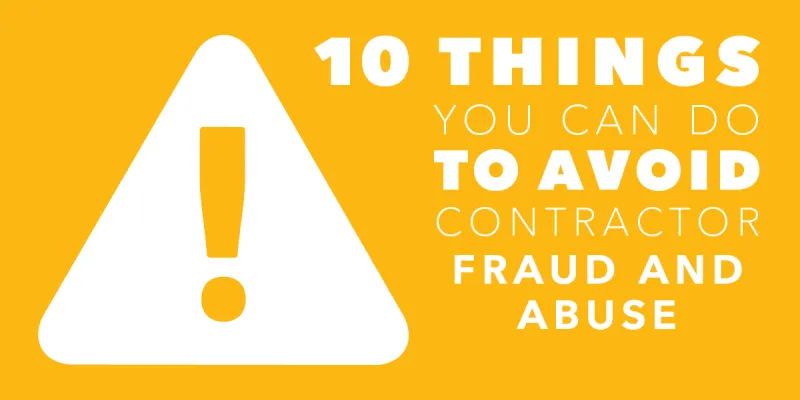
10 Things You Can Do to Avoid Contractor Fraud and Abuse
After a disaster, fraudsters and scam artists often arrive quickly. The NAIC has tips for how to protect yourself and your hard-earned money.
-
Contact your insurance company to file a claim BEFORE you hire a contractor. Your insurer will verify the repairs that need to be made.
-
Make sure the contractor you hire for home repairs is legitimate. Search for the company online and read reviews. Find out if there are complaints against the contractor with the Better Business Bureau and your state attorney general's office. Ask for references.
-
Know the warning signs of a shady business. A reputable business will not pressure you to make a quick decision, nor will it ask you to pay money upfront.
-
Don’t pay in full upfront. Pay in installments with a check or credit card to leave a record of your payments. Get an invoice and a receipt.
-
Get an estimate from at least three different contractors. An estimate from a contractor that's much lower than any of the others doesn't mean it's the best deal. Make sure all the quotes include the same things, and check references.
-
Learn the difference between “licensed” and “registered.” The difference is important. A licensed contractor has passed exams and met other requirements to show that they are competent. A registered contractor has provided contact information to a government authority. You can learn more about contractor licensing and registration by calling your state department of insurance (DOI).
-
Be cautious about signing an assignment of benefits (AOB), an agreement a policyholder signs that allows a third party, such as a contractor, to act on behalf of the insured. AOBs allow direct payment from the insurance company.
-
Educate yourself about the recovery process. The NAIC’s Post-Disaster Claims Guide can help you.
-
Get a written contract. The contract should include every task and repair the contractor plans to make. It should also include start/finish dates and prices for repairs and materials. Do not sign a blank contract, as a contractor can fill it in later with whatever information they want.
-
And finally, before you hire someone, get the following information:
• A copy of the contractor’s identification that shows the contractor’s name and the name of the business.
• A copy of the contractor’s business license. Make sure it is not expired.
• A copy of the contractor’s proof of liability insurance. Make sure it shows the company’s name, phone number, and the policy number. Call the insurance company to verify the coverage.
• A copy of the contractor’s proof of workers’ compensation insurance.
About the National Association of Insurance Commissioners
As part of our state-based system of insurance regulation in the United States, the National Association of Insurance Commissioners (NAIC) provides expertise, data, and analysis for insurance commissioners to effectively regulate the industry and protect consumers. The U.S. standard-setting organization is governed by the chief insurance regulators from the 50 states, the District of Columbia and five U.S. territories. Through the NAIC, state insurance regulators establish standards and best practices, conduct peer reviews, and coordinate regulatory oversight. NAIC staff supports these efforts and represents the collective views of state regulators domestically and internationally.
